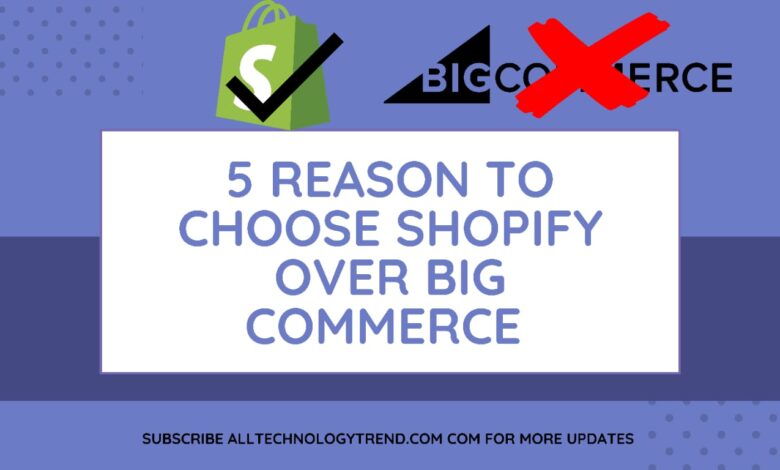Shopify vs BigCommerce 5 Reasons to choose Shopify

Hey! Today we will talk about Shopify vs BigCommerce and five reasons to choose Shopify over Bigcommerce.
You are doing your research and being a good merchant. That’s nice to see because choosing an e-commerce platform is a big decision. Of course, you’ve heard of Shopify.
Everyone has heard of Shopify, but I’m assuming you’re here because you’ve also heard of BigCommerce. And you’re wondering how they compare to each other.
Hopefully, I can make your life just a little bit easier. Because in this article, I’m going to give you five reasons why you should choose Shopify vs BigCommerce.
Pull yourself up a chair, and let’s talk about it. In this series, we’ve been exploring reasons why you would choose one e-commerce platform over another. With both Shopify and BigCommerce being SaaS platforms, this discussion is a bit more subtle and nuanced.
Shopify vs BigCommerce
In this article, I will give you five reasons to choose Shopify in Shopify vs BigCommerce. Then at the end of the article, I’ll link you to another one. Where I give you five reasons you should choose BigCommerce in Shopify vs BigCommerce.
In all of these articles, I’m sure to mention that no one is unbiased, myself included. I have my favorite platforms. In this case, we’re BigCommerce partners don’t do so much with Shopify. Hopefully, those reasons help make your decision just a little bit easier.
However, I’m not here to sell you anything. I want you to end up on the absolute best platform for you.
Now, I’ll roll through these five things that I think are Shopify’s most significant advantages. But it’s not these things that have me most excited about the Shopify platform.
At the end of this article, we’ll discuss the big picture thing. That I think makes Shopify stand out over Shopify vs BigCommerce and all the other e-commerce platforms.
Now, as we go along, I’m sure I’ll give them numbers. But these are really in no particular order, so let’s get into it.
First reason:
And the first reason to choose Shopify vs BigCommerce is some functionality differences. There are a couple of features here worth pointing out.
First, Shopify provides automatic abandoned cart recovery at a lower price point than BigCommerce. Abandoned cart emails are essential, and if you’re on the entry-level plans, it’s included with Shopify but not with BigCommerce. Now, once you move up to the mid-level schedules, both platforms have this feature. So if you’re Mr. big moneybags, it doesn’t apply to you.
Point-of-sale is another big piece of functionality that might make a difference in your decision-making process. Although point-of-sale terminals are an option on BigCommerce, Shopify has a fully integrated solution directly from Shopify themselves. And that can make your life a lot easier if point-of-sale is essential.
So if you plan on selling goods in some physical store or pop-up shop or something similar. Then this could be a big checkmark on the Shopify side of your comparison.
Now, this next one is not so much a feature of the platform itself as it is a benefit of the community that’s grown up around Shopify.
In Shopify vs BigCommerce,
Shopify heavily advertising itself to those merchants just getting started. It’s grown a community of providers catering to the drop-shipping market. That means the tools, resources, and knowledge to help you grow your drop-shipping brand are more readily available on the Shopify platform.
Although drop shipping is not exclusive to beginning stage entrepreneurs, those just getting started in e-commerce are more likely to dropship products exclusively. The cost structure of the platform and ease of getting going with Shopify are very appealing to this market. So, if you’re just getting started and looking for the cheapest, quickest, and easiest way to get a dropshipping store up and going, Shopify is a clear winner in Shopify vs BigCommerce.
Even if you’re a more established merchant and drop shipping is a big part of your business, you may find the marketplace tooling to be a better fit for your needs. But, you’ll need to do some research to be sure.
Second reason:
And the second reason to choose Shopify vs BigCommerce is that there are more apps in the app marketplace. There are significantly more third-party apps available for Shopify than for BigCommerce.
Some BigCommerce supporter, I’m sure it’s going to chime in here and claim that BigCommerce has more functionality and thus has a lesser need for third-party apps. If you’re a slick salesperson trying to persuade somebody to choose your e-commerce platform, that’s a solid line.
But, whether that’s true or not in your particular case depends on the functionality you’re looking for in your store. So, it’s tough to generalize an answer, so we’ll base this just on statistics alone. just based on statistics, if you want some random piece of functionality that the core platform doesn’t provide, there’s a more substantial chance that someone in the Shopify marketplace offers that functionality.
If you geek out on perusing third-party apps for additional functionality, then Shopify’s got what you need in comparison between Shopify vs BigCommerce.
Oh yeah, enjoy that marketplace. At some point, if you’re serious about e-commerce, you’re going to want to accomplish something that your cart of choice won’t do. Having a large ecosystem of apps might be just the thing that makes your needed functionality affordable. And keeps you from having to have a custom-developed.
Worst,it’s a safety net if budget is your biggest concern. Sure these apps can cost money but are frequently much cheaper than trying to create that functionality on your own.
Third reason:
And the third reason to choose Shopify over BigCommerce in Shopify vs BigCommerce is that there are no limits on the number of sales for your store. If you’re happy with the features of your Shopify store, then you keep growing that store without having to upgrade to a more expensive plan. You’re an intelligent merchant, so I’m sure sooner or later you’ll figure out that some limitation is holding you back and decide to upgrade to the robustness of a larger plan.
But, there’s no one forcing you to make that decision. You can do it on your own time. The majority of Shopify’s money comes from payment processing, so they don’t give a damn about your measly little subscription revenue.
BigCommerce, on the other hand, doesn’t push you into an in-house payment processor or charge transaction fees. That means the subscription income is a big part of their revenue, so they care. But, because of that, their pricing is unfortunately based on your sales volume. Understandably so, a man’s gotta eat.
For instance, their cheapest plan allows you to do $50,000 a year in sales. Once your sales for the preceding 12months go over that amount, they’ll require you to upgrade to the next tier. Now, that should be a smooth process. It’s not like you have to rebuild your whole site or anything. It’s just a flip of a switch, but it does give you less control over which plan you are on and what your costs are.
You’re not allowed to choose a plan based solely on the features provided in that plan like you can with Shopify.
Fourth reason:
And the following reason to choose Shopify over BigCommerce in comparing Shopify vs BigCommerce is theme availability. Traditionally, one of the most significant costs associated with a new website build is dialing that theme in just perfectly. It can cost thousands, tens of thousands of dollars if you’re designing and building it from scratch.
Now, I don’t have that kind of cheddar laying around, and you probably don’t either. But, luckily, you don’t need to if there are cheaper options available.
Now, BigCommerce has some excellent themes on the marketplace, so it’s not like you don’t have any good theme options over there. But Shopify is on another level with the quantity and quality of the themes available.
Often for the price of taking my family down to the local Starbucks for a whole bunch of mocha frappe-latte-casinos, you can have a clean design to use as the basis of your online business. That can cut your overall build cost significantly and allow you to use that money for something that moves the needle or perhaps is more fun, like a nice bottle of whiskey.
Fifth Reason:
And the fifth reason to choose Shopify vs BigCommerce is its ease of use. The more flexibility and options a platform has, the more complicated it is to work on Shopify.
Shopify was designed from the ground up to be simple, and surprisingly to me; it has maintained that focus over the years. The whole business allows merchants to get an e-commerce operation going as quickly and as efficiently as possible.
It’d be real simple for them to lose that focus as other platforms use it against them in their sales and marketing, but they’ve stayed true to that vision.
Now, simplicity is going to come with limitations.
When we discussed the benefit of Shopify’s competitors in Shopify vs BigCommerce, we’ll talk about how these limitations can hold you back. BigCommerce is going to sell against Shopify by touting their more robust functionality.
But that, by nature, leads to slightly more complexity. Suppose Shopify limitations don’t apply to your business or don’t bother you. Why in the world would you add the complexity that comes with the flexibility of any other platform.
If you don’t have very technical resources to help you manage your business and simplicity is your jam, perhaps sticking with the platform built for simplicity is the right call.
May These questions disturb you the most like,
-
- is Shopify or Bigcommerce better?
- Which is better, Shopify or Bigcommerce?
- What’s better, Shopify or Bigcommerce?
For answering all your questions are going to summarize the things.
I’m going to recap these five reasons for Shopify vs BigCommerce, and then we’ll get into discussing the real thing that has me excited about the Shopify platform.
So, to recap, compare Shopify and Bigcommerce,
five reasons to choose Shopify versus BigCommerce are:
| Number 1: | |
| Functionality differences like abandoned cart emails on the lowest plan and native point-of-sale integration are better suited for dropshipping. | |
| Number 2: | |
| Number two, it has more apps to add functionality. | |
| Number 3: | |
| Three, you get to choose your plan as it’s not based on your sales volume. | |
| Number 4: | |
| Four is the variety of high-quality themes. | |
| Number 5: | |
| And five is that it is so damn simple to set up and use. |
After reading these reasons now, you can easily decide
which is better, Shopify or Bigcommerce?
Like seriously, my nine-year-old could build a pretty solid e-Commerce business on this thing. All of those are important things to consider if they apply to you, but none of those things are what’s feeding my excitement about this platform.
What I think sets Shopify apart is its vision for the future. Other e-commerce platforms are trying to be the best traditional e-commerce platforms, constantly adding new features and trying to sell merchants based on those features. Shopify’s vision seems to be more significant.
They haven’t revealed their overall plans, but you can see the building blocks starting to shape up. Also, they recently re-branded Shop Pay. And they have a very young fulfillment network they’re building and a trendy e-commerce platform. In all of their marketing and the stories that they’re out there seeding about themselves, they aren’t comparing Shopify to other e-commerce platforms.
They’re comparing themselves to Amazon.
Shopify vs Amazon
Now, at first, I thought that was arrogance because that comparison doesn’t hold up. But, after seeing some of these pieces start to come into place, I now believe that it’s a clue about what they’re trying to build. I don’t know if they’ll eventually tie all of the building blocks together with an actual marketplace to compete with Amazon, but it’s apparent that they’re building towards something exciting.
Now, I’m not advising you to make important decisions about your business based on speculation of Shopify’s plan that may or may not ever come to fruition. But it’s something to keep a check.
With Shopify vs BigCommerce, you have to get into the weeds to understand the differences between the two. Which is best again depends entirely on your needs, but hopefully, this gave you a little insight into the benefits of Shopify and helped you market hat decision.
As promised, I’ve also created an article outlining five reasons why BigCommerce might be a better fit for you, and I’m going to pop that up on the screen here in just a minute.
If you consider these two platforms, give that article a read, and hopefully, it’ll help clarify the other side of the argument made here. And most definitely, let me know your thoughts in the comments of this video. Do not let my opinion be the only one that’s heard.
That’s all for Shopify vs BigCommerce.
Who knows?
This might be the one in a million times that I’m entirely wrong, and this is your chance to point it out. It happens. It’s also always helpful if you’ll hit that thumbs up button or, I guess, the thumbs down button if you hate what we are doing here.
I appreciate your reading if you are interested in staying up to date on the latest in enterprise e-Commerce or taking your eCommerce skills to the next level, then consider hitting about us.



